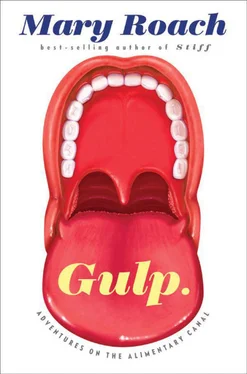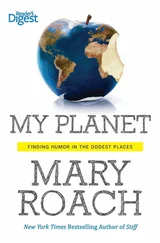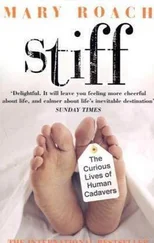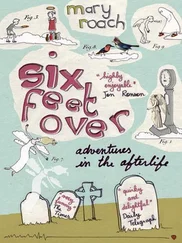Things haven’t changed all that much for Julie Furne. We find her in the lab, syringing gas out of a plastic vial in which a raisin-sized rat turd has been incubating at ninety-nine degrees. (She and Levitt are investigating the relationship between intestinal hydrogen sulfide and colitis. More on this shortly.)
Furne recently arrived at her fifth decade, her brown hair beginning to silver at the hairline but a girlish humor still intact. Instead of a lab coat, she wears a muted orange heather cardigan, vintage from the fifties, I’m guessing. There was probably a time when you could have pressed this sweater to your face and smelled traces of hair spray or homemade pot roast. Probably you wouldn’t have that experience now.
“This is Mary,” says Levitt. “She’d like to sniff some gases. But don’t kill her.”
Hydrogen sulfide is as lethal, molecule for molecule, as cyanide. This may explain why humans evolved such exquisite sensitivity to its smell. Repellent odors are unpleasant but often helpful in terms of not dying. As with any poison, dosage makes the killer. The concentration of hydrogen sulfide in offensive human flatus is around 1 to 3 parts per million. Harmless. Ramp it up to 1,000 parts per million—as can exist in manure pits and sewage tanks—and a couple breaths can cause respiratory paralysis and suffocation. Workers die this way often enough that a pair of physicians, writing in a medical journal, coined a name for it: dung lung. [98] One of the physicians was a Dr. Crapo, who would, you’d think, have long ago ceased to find that sort of thing amusing.
Hydrogen sulfide is so swiftly lethal that farm- and workplace-safety organizations urge anyone who enters a manure pit or attempts to clear a blocked sewage pipe to wear a self-contained breathing apparatus. Which may explain the man my husband and I once saw walking along a sidewalk in San Francisco in a wet suit with a toilet plunger over his shoulder. “Hell of a clog,” Ed said.
It is fitting that the Devil is said to smell of sulfur. Hydrogen sulfide is a diabolical killer. Its telltale rotten-egg smell, screamingly obvious at 10 parts per million, disappears at concentrations above 150 parts per million; the olfactory nerves become paralyzed. Without the odor to warn them, coworkers and family members may rush into a manure pit to rescue the fallen. Whole families have been taken out in a catastrophic “chain of death.” One case report included a police photo taken after the victims had been pulled from the mire and laid on the ground. It was a wrenching play on the family portrait, the four adults arranged in a row in matching knee-high muck boots, black bars over their eyes. The farmer had gone in to unclog a pipe. Both he and the worker who tried to rescue him collapsed and died. The farmer’s mother found the two, hurried down the ladder and also succumbed. Then the son came along. And on it went, all the way to a team of pathologists nearly overcome in a poorly ventilated autopsy room.
Hydrogen sulfide is a reliable way to kill oneself—as well as the people who try to save you. In 80 percent of the hydrogen sulfide suicides in this country, emergency personnel or good Samaritans have been sickened by the fumes when they tried to help. One suicide in Japan caused the evacuation of 350 neighbors.
“Ask Julie how she felt,” says Levitt over his shoulder as he leaves. The day of her training as a flatus odor judge, Furne worried that she’d poisoned herself. She was “sick as a dog” and had a headache all that evening. Vegetarian activist John Harvey Kellogg wrote that he had “known vigorous young men” who suffered “violent attacks” of headache from working in a lab with “the bowel discharges of a meat-eater.”
The hydrogen sulfide pulled from the tube that held the fermenting feces of rat E2 clocks in at a concentration of 1,000 parts per million. “You don’t want to smell that straight up,” says Furne. She glances off to the side, reading out an imaginary headline: “AUTHOR KILLED BY FECAL ODOR.” Furne has a homey northern Midwest accent, the voice of Fargo ’s Margie, diluted to a nonlethal concentration.
But this is hydrogen sulfide off-gassing in a vial smaller than a lipstick. Are there circumstances in which ordinary concentrations can harm you? Are flatulent people a public health risk? The author of Inner Hygiene , James Whorton, quoted a nineteenth-century physician who thought so. He admonished the flatulent to hold in their gas for the sake of family and friends, saying, “It is as much a crime to poison a neighbor with gas, as with a poison more tangible.” I wondered if there might be a grain of truth to this—inside a confined space, say. When it’s cold, I tell Furne, I sometimes sleep with my head under the covers. Winter is brussels-sprout season, and they’re Ed’s favorite side dish.
Furne assures me there’s enough air under a comforter to dilute a spouse’s hydrogen sulfide and render it harmless. When I followed up with Levitt by e-mail, he concurred that the “passive inhaler” has no cause to worry.
Especially compared with the perpetrator. He who dealt it incurs a “relatively enormous exposure to hydrogen sulfide via absorption through the colonic mucosa.” Or as John Harvey Kellogg rather more excitably put it, “If the mere breathing of the greatly diluted volatile poisons arising from such putrescent matter will produce highly unpleasant effects, how much more grave must be the effects when through the retention within the body… all of their poisonous contents are absorbed and sucked up into the blood and circulated throughout the body?” Levitt had been quick to add that no research has shown that absorption—of hydrogen sulfide or any other colon-residing breakdown component—into the bloodstream is harmful.
In matters of health, however, the public rarely requires proof. Most people trust intuition more than they trust studies. And the theory behind fecal self-poisoning—aka autointoxication—makes strong intuitive sense. “[People] reasoned that if feces are foul, then the body must be in the best condition when freest from such material,” wrote Walter Alvarez in his wise and tide-turning 1919 essay in the Journal of the American Medical Association . The less time “feculent” poisons reside in our colons, the thinking went, the less we absorb into our blood, and the healthier we’ll be. Autointoxication was one of the most pervasive and enduring concepts in the long, bloated history of medical pseudoscience.
AS A DIAGNOSIS, a health buzzword, autointoxication peaked in the early 1900s. It was a natural offshoot of “miasma” theory. From the early to the late 1800s, before physicians figured out the role of microorganisms and insects in causing and spreading disease, much of the blame was placed on clouds of nonspecific toxic gases—or miasmas—emanating from open sewer flows, garbage dumps, even graves.
If one bought into the dangers of miasmas, it wasn’t much of a leap to buy into the dangers of one’s own internal sewage. Purveyors of laxatives and enema devices played up the connection, referring to the colon as “the human privy,” “an obstructed sewer,” “this cesspool of death and contagion.” Whorton’s book reproduces a magazine ad for the French laxative Jubol, showing tiny uniformed men on their hands and knees with scrub brushes and buckets inside a colon, like workers in the Paris sewers. [99] Heartlessly, Jubol failed to provide its imaginary workers with tiny face masks. Or shoes! They’re barefoot in there! In reality, it’s people inside French sewers who deserve our concern, not people inside sewers inside French people. France’s Department of Occupational Epidemiology found elevated rates of liver cancer among Parisian sewer workers, though most of them also drink to excess, and who can blame them.
Читать дальше












